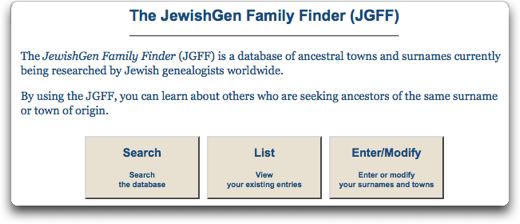If you’re seriously researching your Jewish roots then you already know about the JewishGen Family Finder (JGFF), but for those who are just getting started I wanted to point out this critical resource and explain what it can and cannot do.
The JGFF is part the much larger JewishGen web site, and what it does it simple – it lets you find other researchers searching for the same surnames and towns as you. This is particularly important if you have a very common last name (try researching Cohen without knowing which town your family came from) or if you don’t yet know from which town your family originated.

Let’s say you’re researching the name Cohen. You know your family lived at one point in Lancut. You go to the JGFF web site, log in (with your JewishGen identity) and from the page shown in the screenshot above, you select Enter/Modify. On the next screen you add the name Cohen and the town Lancut, Poland. When you enter a town that is in JewishGen’s database, a small icon should show up next to the town name indicating it has been found. You can enter a town that is not in their system, but chances are if you’re entering a town it’s in there and you should double-check your spelling. As with all resources on the JewishGen site, all towns are referred to by their current names and countries. Thus even though the Yiddish pronunciation of the town name of Lancut would probably be Lantzut, and the town was once part of the Austrian Empire, it is always referred to but the current name and country, so you should enter Lancut, Poland.
It’s also important to recognize what the JGFF cannot do. It doesn’t list individual relative names, so there’s no way to know right away when searching if the person who has listed a particular name/town combo is related to you. The JGFF is also reliant on the individuals who make up its members to update their information, and sometimes people change their e-mail addresses and forget to update the JGFF. If that’s the case and you try to send them an e-mail, you will not reach them obviously. You will also find that some of the members are deceased, and when a particular member dies, if you know the person, you can tell the people who run the JGFF and they will mark that account as deceased, so the information doesn’t go away, but people will know not to contact the person.
JGFF has several levels of privacy, so you can show you name, your address, etc. or you can just show your researcher number and make the people send you an e-mail to find out who you are. This sounds great, unless the person who didn’t show their name changes their e-mail address or dies, and there is no way to know that they have an account on JGFF to change. In general, I would suggest at least showing your name when setting up your listing, so in case someone wants to reach you, they can google you as well if necessary.
Different people have different strategies of how to use JGFF. You can put I think up to 100 name/town combos into the system, so you have some flexibility. You can stay minimal and just put the names and towns you know relatives were born into, or you can add many different variations for the names, and you can choose to add towns that may wrong, but you think your family may have lived. If you find a reference in your research to a town you didn’t know about, you can add the name/town combo in case someone comes across the same piece of information, even if you have no real proof that your family lived there. Remember that the JGFF is not a definitive listing of where families lived, it is only a list of where people are researching their families. This is an important distinction.
In the same vein, I recommend putting in as many variations of the last name as you’re comfortable with, as it seems some people are very strict with spellings or they may search during ‘exact’ spelling instead of ‘sounds like’ and thus like Cohn and Cohen might be the same family, if you wrote Cohen and they searched for Cohn, they wouldn’t find anything.
As you research your family and find new names and towns, you should be constantly updating your listings on the JGFF. You never know when someone is going to search the JGFF and if you don’t post a connection (like you find your great-grandmother’s last name and birth town) you may miss someone else searching for the same combination. In my own experience, I added a name and town of a relative that I had known about for a long time but had not bothered to post to the JGFF, and within a couple of months I received an inquiry from someone who turned out to be my fourth cousin, and who listed just 2 minutes away from me.
In short, if you’re researching your Jewish family members, use JGFF and use it often.
2 thoughts on “Jewish Genealogy Basics: The JewishGen Family Finder (JGFF)”